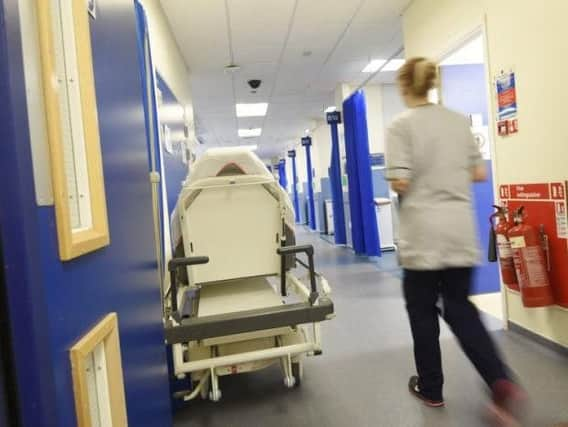Scotland's emergency departments stretched to breaking point as hospital bed numbers are 'slashed'


The Royal College of Emergency Medicine reacted to the latest Scottish Government figures released today which show that the average number of available beds for acute specialities in 2018/2019 stood at 13,105.
This represents a decrease of 2 per cent on 2017/2018 and a 6 per cent reduction when compared to 2013/2014.
Advertisement
Hide AdAdvertisement
Hide AdDr David Chung, Vice President of RCEM Scotland said patient safety was being compromised by the lack of available beds.
He said: “Today’s data confirms what Emergency Departments staff have known for a long time: capacity in hospitals across Scotland is declining.“Every day we see more and more patients in Emergency Departments who wait a very a long time to be admitted to a hospital bed. Emergency Departments are stretched to the limit because bed numbers have been slashed year-on-year.“There is a reason why we advocate for an 85 per cent threshold in hospitals, it provides the system with additional capacity to cope with changes in demand. Anything above this clogs up the system and compromises patient safety."
He added: “Clearly the health and social care system cannot cope with the current level of resource and capacity. An increase in the number of available staffed beds would go a long way to bring down bed occupancy to safe levels.
"However, this needs to go hand-in-hand with additional resource allocation to deal with rising demands on the NHS”.
In 2018/2019, bed occupancy for acute specialities in Scotland stood at 87.1 per cent, representing an increase of 0.4 percentage point increase from the previous year.
Last time NHS Scotland met the required 85 per cent occupancy level for acute specialities was 2011/2012.
The figures from the government's own Information Services Division show that one in eight Scottish residents around 698.000 were admitted to hospital in 2018/2019.
Advertisement
Hide AdAdvertisement
Hide AdOf these, more than two thirds (69 per cent) had a single admission to hospital with three out of ten patients having more than one admission.
Acute hospital care includes services such as consultation with specialist clinicians, emergency treatment, complex and life saving surgery and specialist diagnostic procedures.
The Scottish Conservatives said the latest figures follow a trend in recent years of reducing bed numbers, at a time when Scotland’s population isn’t just expanding, but also getting older.
Shadow health secretary Miles Briggs said the fall was more evidence of SNP negligence when it comes to running the NHS.
He said: “Only the SNP could think it acceptable to cut bed numbers at a time when hospital admissions are increasing.
“The nationalists have been warned for years about Scotland’s expanding and ageing population, and the impact that would have on our NHS.
“Yet they’ve not properly addressed staffing levels, nursing and consultancy vacancies are at a record level, and now we learn bed numbers are dropping too.
“It’s no wonder people are getting increasingly fed up with the level of care they are receiving under this SNP government.
Advertisement
Hide AdAdvertisement
Hide Ad“This negligence not only impacts the health of patients, but it places an intolerable strain on staff who are already going beyond the call of duty to keep the health service going.
“SNP ministers need to provide the evidence and future planning for beds, especially at a time when we are seeing increasing demand for dementia beds at the same time as these are being cut.”
A Scottish Government spokesperson said: “We want more people to be at home or in a homely setting if they do not need to be in hospital and there are a number of ways that the NHS and its partners are achieving this, including reducing patient length of stay and providing alternatives to hospital admission. Since 2013–14 the average length of stay for elective patients has reduced by almost 12 per cent.
“All NHS Boards should have the right number of hospital beds in order to meet the changes in demand from season to season, and from year to year and it is important that changes to hospital bed numbers are planned and orderly.”